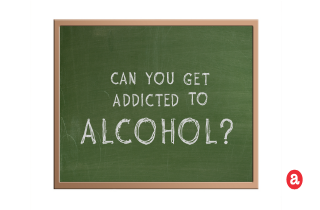Yes. Alcohol can be addictive for some people.
In fact, nearly 17.6 million adults in the US struggle with alcohol addiction or abuse. Alcohol stays in the system 24 hours after a drinking session, but may take a week or so to leave the body if you are a problem drinker. Even if you aren’t physically dependent on alcohol, drinking too much can easily lead to alcohol abuse. So how much drinking is too much? What’s the difference between alcohol abuse and addiction? How can you go about quitting or cutting back your alcohol intake? Keep reading for answers to these questions and more.
What’s in alcohol?
Alcoholic drinks contain a chemical called ethanol, or ethyl alcohol. Ethyl alcohol is produced by the fermentation of yeasts, sugar, and starch. The amount of alcohol found in different drinks varies. For example, wine is more alcoholic than beer. But distilled spirits and hard liquors such as vodka can be so strong that a drinker may only be able to tolerate a small amount before becoming intoxicated. The CDC considers a “standard” drink anything that contains 0.6 ounces of pure alcohol. That would be the equivalent of:
- 12 ounces of beer
- 8 ounces of malt liquor
- 5 ounces of wine
- 1.5 ounce shot of an 80-proof liquor
What does alcohol do in the body?
The effects of alcohol are not limited to any one system of the body. When you drink, alcohol impacts every internal organ. Alcohol depresses the central nervous system, causing drowsiness, lightheadedness, dizziness, loss of coordination, and behavioral changes. Alcohol also impairs judgment and coordination, making it impossible to drive safely. In large quantities alcohol causes nausea, vomiting, loss on consciousness, and sometimes even death. Alcohol consumption can also be especially dangerous for pregnant women, as alcohol abuse causes serious birth defects.
How do you get addicted to alcohol?
Many people drink socially and never become alcohol addicts. While moderate alcohol use is perfectly safe (and may even have some beneficial health effects), nearly 17.6 million adults in the US struggle with alcohol addiction or abuse. Individual reactions to alcohol can depend on a number of factors, including:
- age
- ethnicity
- gender
- a family history of alcohol abuse
- physical condition
- the use of drugs or prescription medications
What does it mean to be addicted to alcohol?
Men are considered heavy drinkers if they have more than 4 servings of alcohol in one day, or more than 14 per week. Women, since they tend to be physically smaller and able to become intoxicated more easily, are considered heavy drinkers at more than 3 alcohol servings a day, or 7 per week. Heavy drinking doesn’t necessarily make you an alcohol addict, but it does up your chances of addiction to 1 in 4.
It’s important to note here that alcohol abuse is different from alcohol addiction. Alcohol abuse can easily become an addiction over time, but abuse is not addiction. While abusing alcohol can cause you to fail to fulfill your personal and professional responsibilities, can put you in dangerous situations, and can cause relationship problems, it doesn’t necessarily become a physical addiction in all people. An addiction manifests as a strong, uncontrollable craving for alcohol, an inability to limit drinking, and withdrawal symptoms.
Who gets addicted to alcohol?
People from all walks of life can become addicted to alcohol. Research has found that women with antisocial behavior patterns and highly impulsive personalities are more likely to get addicted to alcohol than those with healthy patterns. Men and women are both more likely to become addicted to alcohol if they have high levels of anxiety, or a family history of alcohol abuse. One factor that actually protects against alcohol addiction is when an individual has a healthy social support network.
How to avoid alcohol addiction
You can avoid getting addicted to alcohol by moderating your intake and being careful not to drink heavily. Drink slowly and pace yourself. Have juice, water, or another nonalcoholic beverage between drinks. If you have alcohol addicts in your family, you might want to consider quitting drinking entirely.
Do you have problems with alcohol?
If you have a problem with alcohol, whether you are addicted or just drink in risky situations, there is help. And it is possible to quit drinking without AA. You can tackle your addiction yourself by finding alternative activities, avoiding people and places that make you want to drink, and have a plan in place in case you’re tempted. Enlist friends and family to help support you in cutting back or quitting. You might want to consider therapy or joining a support group to help keep you accountable. Finally, alcoholism may be a tough habit to break, but give an alcohol abuse treatment program a try and see how much it can help.
Please leave us your questions about alcohol use, abuse and addiction below. We will be happy to try to answer your questions personally and promptly. Or refer you to a resource who can help.









Related Posts